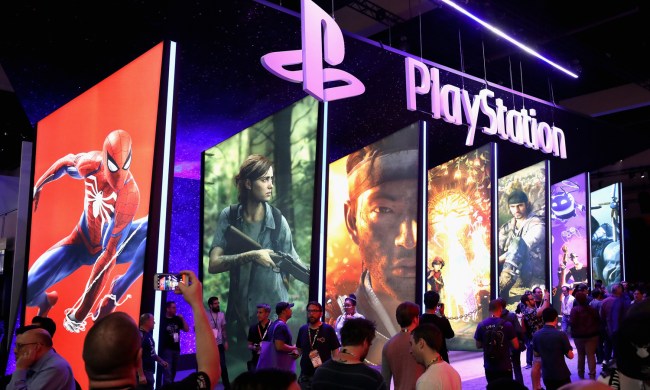The last year has been a tumultuous and divisive one for the gaming community — and I’m not talking about the merits of PCs versus consoles. The debate over the way women are represented in games and the community around them came to a boiling point, and the resulting clash made it seem women would never find acceptance in the industry.
Yet it appears the numerous arguments, editorials and videos published on the topic haven’t been for naught. This year’s conference showed a refreshing change of pace, with more women on stage and in games than in years past. Progress, it seems, is not impossible.
Taking a step back
For the second year in a row, Aisha Tyler of Archer fame hosted Ubisoft’s press conference. Her humor, improvisational background, and strong stage presence make her an excellent choice for the event. That’s why you might have totally missed her unhappiness with Ubisoft.
“Female characters in Watch_Dogs exist to be killed, kidnapped, or threatened in service of the plot.”
After the Rainbow Six: Siege trailer showed up on screen, Tyler invited Angela Bassett, who plays Six, onto stage. After remarking that her character seems complex and deep, Tyler reminded everyone that she had acted in Ubisoft’s 2014 game Watch_Dogs, and reminded the crowd her character was “pancaked by a dump truck.” That might seem at first like an offhand remark by an actress who felt her role could’ve been thicker, but it was also a nod to an issue that Ubisoft has been struggling with for some time.
Back in June of 2014, Kotaku published a review of Watch_Dogs that was less than favorable. The reviewer criticized it mostly for acting like it would be different than other open-world games, and then not delivering. But there was another thread in the review, a point that most didn’t want to consider, and either ignored, or denied with anger.
“Female characters in Watch_Dogs exist to be killed, kidnapped, or threatened in service of the plot, and the lone exception eventually proves not to be an exception at all,” the reviewer, Kirk Hamilton, pointed out. Like so many games, Watch_Dogs revolved around a white, male protagonist who often found himself saving – or not saving – women and minorities to move the story forward. Worse, the game’s mechanics trivialized the humanity of these acts, making them more akin to hacking a computer or stealing a car.

That’s just one game, but it’s a trend that runs through a lot of AAA games as of late, from Shadows of Mordor to Grand Theft Auto V. Now, though, we’re seeing a shift towards better representation of women in games. Hopefully, that will trickle down to better representation in the community, as well.
A new trend in heroes
Ubisoft found itself in particular trouble after issuing a statement saying that the company couldn’t have a female protagonist in Assassin’s Creed: Unity, because of the time and resources it would take. Other developers were quick to step in and claim that it wouldn’t actually have been an issue. Insomniac Games responded by showing off character customization in Sunset Overdrive, which featured many diverse player models, full clothing selection regardless of gender, and an Ezio-esque costume. It was a major PR problem for Ubisoft, a company that’s had more than its share of such squabble as of late.
Almost every game at Microsoft’s press conference included a female character, two offer female leads.
But community complaints didn’t fall on deaf ears. Now, a year later, things look very different for Ubisoft, as Assassin’s Creed: Syndicate will feature Evie Frye, a female assassin whose quick wit and efficiency are her major trademarks. We also saw female characters feature prominently in The Division and Rainbow Six: Siege. Only Ghost Recon Wildlands seemed to fall exclusively within the camp of white-male power fantasy.
We also saw a new title from Guerrilla Games in the form of Horizon: Zero Dawn at E3 this year. This third-person hunting game pits you, a physically imposing heroine, against hordes of terrifying and gigantic robot dinosaurs. We don’t know her name, but we do know that not only is she an experienced huntress, but also a defender of, and provider for, her people. She isn’t scantily clad either — she’s well armored, clever, and has a strong moral code.
The change is most notable, though, in games like Assassin’s Creed, which formerly focused only on male protagonists. Dishonored 2 is a very similar example; it has gained a new heroine that’s playable instead of the first game’s hero. Halo, which started to add female Spartans in Reach, has added a woman-warrior to the cast of Halo 5. Almost every game at Microsoft’s press conference included a female character, and two of them offer female leads.
And women aren’t just appearing in games. They’re also showing up on stage. In addition to Aisha Tyler’s return at Ubisoft, Microsoft opened its conference with a Halo 5 presentation by Bonnie Ross, head of the Halo studio at 343 industries. And then there’s Sigurlina Ingvarsdottir, the lead on Star Wars Battlefront, who has suddenly become a familiar face with appearances not only at Electronic Art’s conference, but also several other company pressers, such as AMD.
Female journalists are starting to have more of a voice too, as the gaming community has fewer people telling them that their input isn’t valued. Morgan Webb was back for Bethesda’s press conference this year, and that was just the beginning. Panels are starting to feature community leaders like Felicia Day and Jessica Merizan that are already well respected around the web.
Refusing regression
That’s not to say the problem is solved. Among the positivity there were plenty of companies that showed signs they’re not on board with expanding the role of women in games. Square-Enix briefly included a single woman on stage, and of course is behind the new Tomb Raider series, but it otherwise was lacking in female representation. Nintendo remains a sausage party. And while the warrior-woman of Sony exclusive Horizon Zero Dawn has already gained a following, Sony failed to include any women on stage.
Nintendo remains a sausage party.
Still, this year’s E3 seems to indicate a shift in thinking, or at the very least an avoidance of regression. Games with strong, female protagonists seem to be more common, and in a lot of ways preferable to the Nate Drakes and Aiden Pearces of the last few years.
As games shift, so does the culture. The boisterous mens’ rights activists who wanted women off their forums and servers hoped to influence developers and publishers, but instead they’ve ended up pariahs. Gaming is about connecting, and building a community — there’s no room for discrimination or judgement.
To me, it’s always been true that gaming is for everyone. Regardless of any other factors in your life, when you pick up the sticks, the only thing that separates you from anyone else is how well you can aim and how quickly you can react.
A great video game takes you away, it brings you to new places, and it doesn’t lock anyone out of that experience. It’s refreshing to see that even developers like Ubisoft that dragged their feet are changing their ways.


